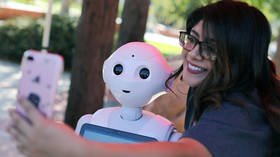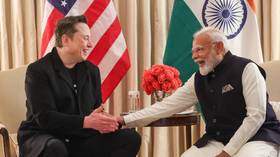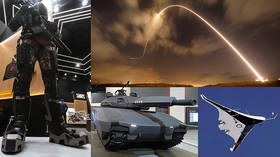AI can’t beat a human in a debate (yet), but give it time…

Humans everywhere breathed a sigh of relief when an AI called IBM Debater failed to beat a human champion during a yearly test of its argumentative prowess, proving there’s at least one thing we can still do better than machines.
World Debating Championship finalist Harish Natarajan outperformed IBM's creation in a debate over whether the government should subsidize preschool education, with judges measuring his accomplishment by the percentage of the audience that changed their minds to agree with him afterwards. Natarajan's performance was all the more impressive given that both he and the computer had only 15 minutes after receiving the topic to prepare their arguments.
Natarajan may have successfully defended the Best Debater title for the human race for another year – though IBM's contestant had picked up some new skills since the 2018 Think conference, beefing up its rebuttals and learning how to deliver a parallel argument – but he's a world-record holder for the number of debate victories. How would the average human fare against the IBM construct when it seems like AIs are outpacing humans in every other arena?
Also on rt.com Resistance is futile: Deepmind's AlphaStar AI hammers StarCraft II pros in world firstAIs have been beating us at chess since the 1960s, but Google's AlphaGo made headlines in 2017 when it trounced the reigning human champion at a Go tournament in Wuzhen, China. Ke Jie, the human, literally bowed to Google's superior product, describing it as "like a god of Go."
When DeepMind's AlphaStar mopped the floor with professional human gamers in a StarCraft tournament last month, it was truly an ignominious day for the human race. The strategic ability required to master one of the most complex strategy games ever devised was once considered a strictly human thing to grasp.
Archaeology doesn't seem like it should be competitive, but it was an AI that discovered a previously unknown human species using DNA analysis in January, solving a genetic mystery that had been plaguing human investigators examining the genetic lineage of modern Asians. How thoughtful of it to find us company for when we too are merely a distant memory among Earth's inhabitants!
Add "doctor" to the list of professions in which humans are no longer secure. Last year, researchers in China and Copenhagen developed an AI that can diagnose prostate cancer as well as a human pathologist. A 2017 study found an AI algorithm could diagnose metastatic cancers faster, too, and a British AI called Optellum was able to spot heart disease earlier than human doctors could.
Even art is no longer sacred, despite years of assurances from AI experts that humans could count on keeping the creative pursuits to themselves. Earlier this week, "ultra-realistic robotic artist" Ai-Da was unveiled in Cornwall, complete with the ability to sketch subjects based on images captured by cameras capable of recognizing human features. It can even talk to its subjects as it paints their portraits, just like a real artist, and already has its first exhibition scheduled for May at the University of Oxford.
Also on rt.com Half of all jobs will be obsolete in 15 years, warns China’s leading AI expertOur silicon rivals have even dabbled in workplace violence, once the purview of humans only. An Amazon warehouse robot put 24 employees in the hospital after it "accidentally" tore open a can of bear mace, spraying its co-workers with concentrated capsaicin.
IBM Debaters's creators told CNET they aren't interested in any more public showcases for the technology, stating they'll be taking it underground to find more "commercially viable" applications – possibly to "help the news media or governments engage people in discussion about contested issues," according to Ranit Aharonov, the project manager. What could go wrong?
If you like this story, share it with a friend!















